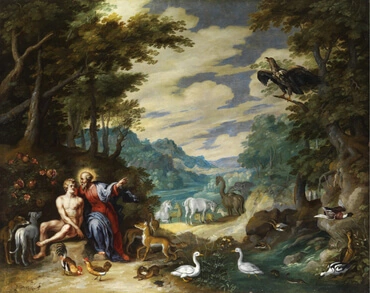1
Conheceu Adão a Eva, sua mulher; ela concebeu e, tendo dado à luz a Caim, disse: Alcancei do Senhor um varão.
2
Tornou a dar à luz a um filho - a seu irmão Abel. Abel foi pastor de ovelhas, e Caim foi lavrador da terra.
3
Ao cabo de dias trouxe Caim do fruto da terra uma oferta ao Senhor.
4
Abel também trouxe dos primogênitos das suas ovelhas, e da sua gordura. Ora, atentou o Senhor para Abel e para a sua oferta,
5
mas para Caim e para a sua oferta não atentou. Pelo que irou-se Caim fortemente, e descaiu-lhe o semblante.
6
Então o Senhor perguntou a Caim: Por que te iraste? e por que está descaído o teu semblante?
7
Porventura se procederes bem, não se há de levantar o teu semblante? e se não procederes bem, o pecado jaz à porta, e sobre ti será o seu desejo; mas sobre ele tu deves dominar.
8
Falou Caim com o seu irmão Abel. E, estando eles no campo, Caim se levantou contra o seu irmão Abel, e o matou.
9
Perguntou, pois, o Senhor a Caim: Onde está Abel, teu irmão? Respondeu ele: Não sei; sou eu o guarda do meu irmão?
10
E disse Deus: Que fizeste? A voz do sangue de teu irmão está clamando a mim desde a terra.
11
Agora maldito és tu desde a terra, que abriu a sua boca para da tua mão receber o sangue de teu irmão.
12
Quando lavrares a terra, não te dará mais a sua força; fugitivo e vagabundo serás na terra.
13
Então disse Caim ao Senhor: É maior a minha punição do que a que eu possa suportar.
14
Eis que hoje me lanças da face da terra; também da tua presença ficarei escondido; serei fugitivo e vagabundo na terra; e qualquer que me encontrar matar-me-á.
15
O Senhor, porém, lhe disse: Portanto quem matar a Caim, sete vezes sobre ele cairá a vingança. E pôs o Senhor um sinal em Caim, para que não o ferisse quem quer que o encontrasse.
16
Então saiu Caim da presença do Senhor, e habitou na terra de Node, ao oriente do Éden.
17
Conheceu Caim a sua mulher, a qual concebeu, e deu à luz a Enoque. Caim edificou uma cidade, e lhe deu o nome do filho, Enoque.
18
A Enoque nasceu Irade, e Irade gerou a Meüjael, e Meüjael gerou a Metusael, e Metusael gerou a Lameque.
19
Lameque tomou para si duas mulheres: o nome duma era Ada, e o nome da outra Zila.
20
E Ada deu à luz a Jabal; este foi o pai dos que habitam em tendas e possuem gado.
21
O nome do seu irmão era Jubal; este foi o pai de todos os que tocam harpa e flauta.
22
A Zila também nasceu um filho, Tubal-Caim, fabricante de todo instrumento cortante de cobre e de ferro; e a irmã de Tubal-Caim foi Naama.
23
Disse Lameque a suas mulheres: Ada e Zila, ouvi a minha voz; escutai, mulheres de Lameque, as minhas palavras; pois matei um homem por me ferir, e um mancebo por me pisar.
24
Se Caim há de ser vingado sete vezes, com certeza Lameque o será setenta e sete vezes.
25
Tornou Adão a conhecer sua mulher, e ela deu à luz um filho, a quem pôs o nome de Sete; porque, disse ela, Deus me deu outro filho em lugar de Abel; porquanto Caim o matou.
26
A Sete também nasceu um filho, a quem pôs o nome de Enos. Foi nesse tempo, que os homens começaram a invocar o nome do Senhor.







